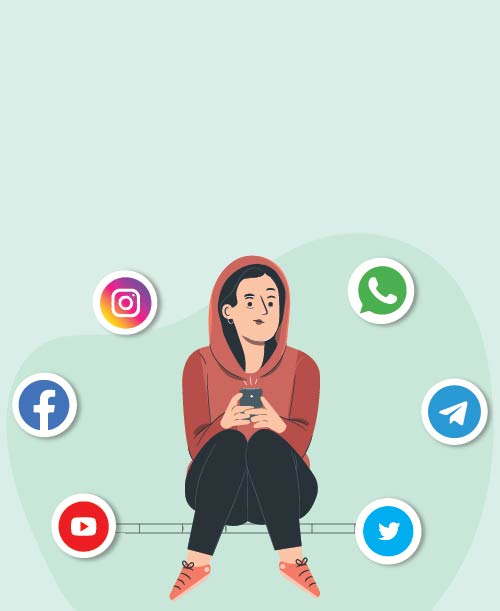

How Social Media Impacts Mental Health and Ways to Take Care
It's no secret that social media is an integral part of our daily lives. However, while it is beneficial in many ways, it also has its drawbacks. It has been found that social media can severely affect mood and cognition, especially among adolescents and young adults. Read on to know more.
Why Social Media is Addictive?
It started with a way of connecting with family and friends, by today it is becoming a compulsion. Continuous scrolling is subliminally influencing your brain. This is because dopamine signals associated with pleasure are being released in your brain which brings in the feel-good factor and makes you spend more on social media. However, the good feeling is short-lived and eventually you find yourself reaching out for your phone to wards off boredom, isolation, and, engaging with the world around you.
Negative Impacts of Social Media on Health
While there are benefits to using social media, it can also result in psychological distress. Several studies have shown a strong link between heavy social media use and a heightened risk for anxiety, depression, loneliness, and even suicidal thoughts. Below mentioned are things you may experience with excess social media usage.
• Feeling of insecurity about your life and appearance
• Feeling bad about oneself by comparing yourself to others
• Low self-esteem and dissatisfaction with life eventually leading to depression
• Self-imposed isolation and disconnect from relationships
• Disrupted sleep patterns
• Difficulty in concentrating and poor performance at work
• Fear of missing out on something exciting that someone else has posted
• Negative impact on your eyesight
Warning Signs to Look Out For
There are several indicators that social media may be negatively affecting your mental health, including:
• Spending too much time on social media, even if it is with your friends
• Feeling low by comparing yourself with others on social media
• Experiencing cyber bullying
• Being distracted at school or work
• Engaging in risky behaviours to get more likes and attention on social media
• Changes in appetite and sleep behaviors
• Becoming fatigued quickly
• Being nervous, sweating, or trembling around other people or in crowds
• Feeling restless or very anxious for no reason
• Avoiding people and worrying about being judged
• Irritability and difficulty calming down when worked up
• Struggling with concentration
• Struggling to make friends
• Extreme self-consciousness – fearing embarrassment, humiliation, and rejection
• Feeling guilty, worthless, or helpless
• Losing interest in activities or hobbies that used to be fun
• Having suicidal and death thoughts
Ways to Minimize the Negative Impact of Social Media on Mental Health
• Be mindful and conscious about your social media usage habits
• Set time limits for daily social media usage
• Schedule a specific time of day to log in to your accounts
• Turn off notifications from social media as they interrupt in your day-to-day activities and also impact your mental health
• Unfollow accounts that make you unhappy
• If possible, ensure that your electronics don't enter your bedroom.
When to Seek Medical Help?
Even after minimizing social media usage, the feeling of loneliness, depression, or anxiety persists, then seek professional help. Talking to a mental health professional can help you build effective coping mechanisms and more effectively navigate your symptoms. They can also help you develop strategies that improve your wellbeing and help you reduce unhealthy habits.
Conclusion
Unhealthy or excessive social media usage can affect your daily life. If you check social media as soon as you wake up in the morning, you must make a conscious attempt to break this habit. Start your day by being grateful for the good things in life. You can also meditate for a while or say a small prayer first thing in the morning. Make sure you follow a morning routine and do not use your phone till you are done with it. Also, turn off social media notifications on your phone and delete certain apps to prevent addiction. These small steps in the right direction can help promote your mental health and stay awaysocial media addiction, anxiety, and depression.
Sources: Healthline, Help Guide, The Guardian
Disclaimer: This blog provides general information and discussions about health and related subjects. The information and other content provided in this blog, website or in any linked materials are not intended and should not be considered, or used as a substitute for, medical advice, diagnosis or treatment. Kindly contact your Doctor before starting a new medicine or health regime.
Related Articles
How Does Raising Mental Health Awareness Help
8 Depression Facts You May Not Know About
Avoid Saying These Things To Someone Suffering From Depression
Effective Ways To Keep Stress Under Control
What Is The Connection Between Heart Health And Stress?
Published on October 04, 2022





 Health Insurance
Health Insurance  Travel Insurance
Travel Insurance  Car Insurance
Car Insurance  Cyber Insurance
Cyber Insurance  Critical Illness Insurance
Critical Illness Insurance
 Pet Insurance
Pet Insurance
 Bike/Two Wheeler Insurance
Bike/Two Wheeler Insurance  Home Insurance
Home Insurance  Third Party Vehicle Ins.
Third Party Vehicle Ins.  Tractor Insurance
Tractor Insurance  Goods Carrying Vehicle Ins.
Goods Carrying Vehicle Ins.  Passenger Carrying Vehicle Ins.
Passenger Carrying Vehicle Ins.  Compulsory Personal Accident Insurance
Compulsory Personal Accident Insurance  Travel Insurance
Travel Insurance  Rural
Rural